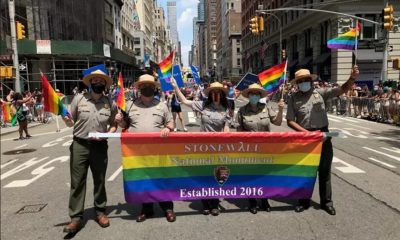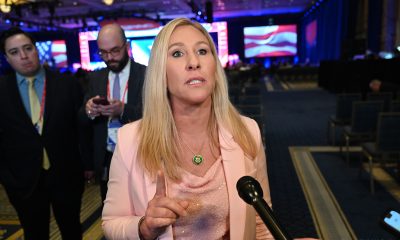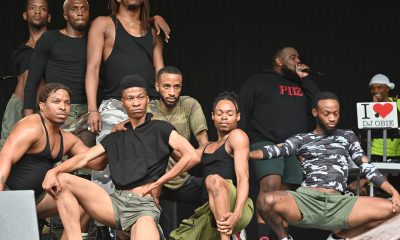National
From LGBTQ book bans to internet bans: A bipartisan attack on knowledge
Online safe spaces for queer youth increasingly at risk
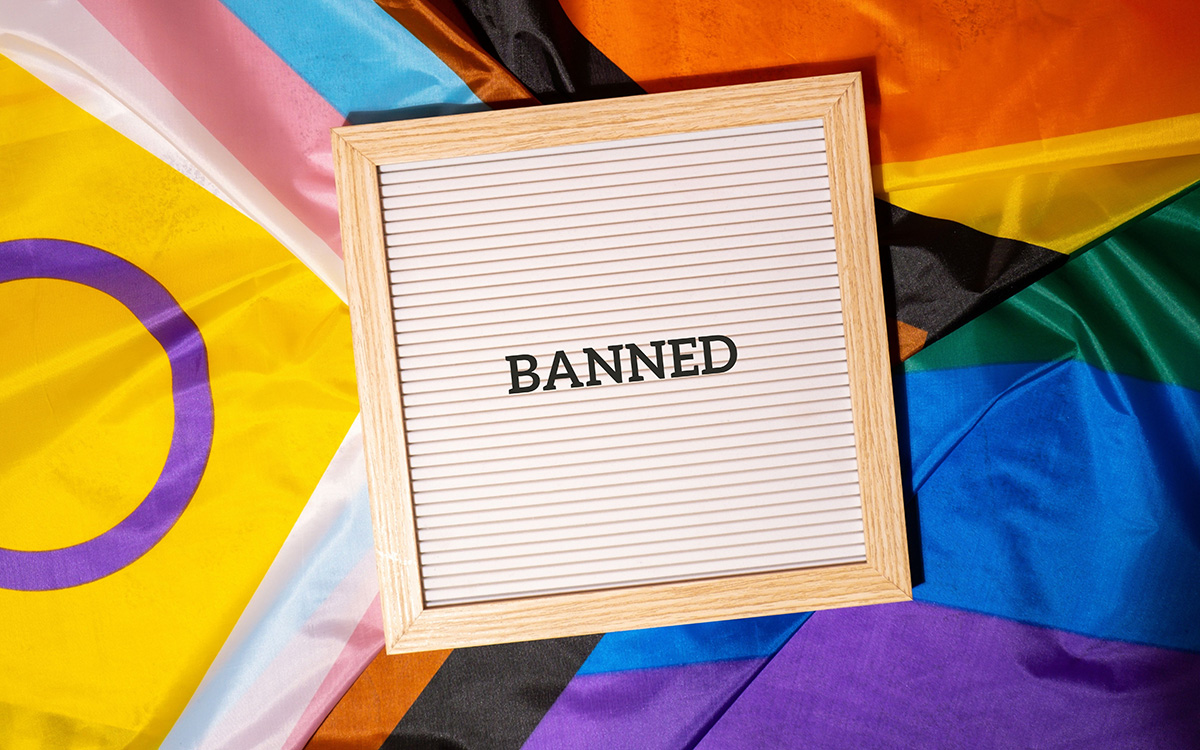
“They had LGBTQ-inclusive books in every single classroom and school library,” Maxx Fenning says of his high school experience. “They were even working on LGBTQ-specific course codes to get approved by the state,” he said, describing courses on queer studies and LGBTQ Black history.
No, Fenning didn’t grow up in Portland or a Boston suburb. Fenning graduated from a South Florida high school in 2020. Florida’s transformation from mostly affirming to “Don’t Say Gay” has been swift, he says. “It feels like a parallel universe.”
Fenning, who just graduated from the University of Florida, follows the developments closely as the executive director of PRISM FL Inc., a youth-led LGBTQ nonprofit he founded at 17. “I’ve watched so many of the things that I kind of took advantage of be stripped away from all of the students that came after me,” Fenning says. “It’s one thing to be in an environment that’s not supportive of you. It’s another thing to be in an environment that’s supportive of you and then watch it fall apart.”
“It’s just gut-wrenching,” Fenning explained, describing how Florida’s increasingly hostile legislation has transformed the state he has lived in most of his life.
Most recently, Florida passed HB3, “Online Protections for Minors,” which bans youth under 14 from having social media accounts. Youths aged 14 and 15 need parental consent before getting accounts and any minor must be protected from “harmful content” online.
Unlike the previous legislation, which came predominately from the right and directly targeted issues like gender-affirming healthcare or DEI, HB3 is part of a bipartisan push across the country to regulate social media, specifically for youth. HB3 was co-sponsored by Michele K. Rayner, the openly queer Black member of the Florida Legislature, alongside many of her colleagues across the aisle. Similar national legislation, like Kids Online Safety Act, includes 68 Democratic and Republican sponsors.
Shae Gardner, policy director at LGBT Tech, explains that this legislation disproportionately harms LGBTQ youth, regardless of intentions or sponsors.
Gardner says that while all these bills claim they are for the safety of kids, for LGBTQ youth, “you are putting them at risk if you keep them offline.” She explains that “a majority of LGBTQ youth do not have access to affirming spaces in their homes and their communities. They go online to look like that. A majority say online spaces are affirming.”
Research by the Trevor Project, which reports that more than 80% of LGBTQ youth “feel safe and understood in specific online spaces” backs this up. Specific online spaces that are under target from legislation, like TikTok, are disproportionately spaces where LGBTQ youth of color feel safest.
“For LGBTQ people, social media has provided spaces, which are, at once both public and private, that encourage, and enhance … a great deal of self-expression that is so important for these communities,” confirms Dr. Paromita Pain, professor, Global Media Studies & Cybersecurity at University of Nevada, Reno. She is the editor of the books “Global LGBTQ Activism” and “LGBTQ digital cultures.”
Fenning emphasizes that with bills like “Don’t Say Gay,” in Florida — and other states including North Carolina, Arkansas, Iowa, and Indiana — LGBTQ youth have less access to vital information about their health and history. “Social media [are] where young people increasingly turn to get information about their community, their history, their bodies and themselves.”
At PRISM, Fenning works to get accurate, fact-backed information to Florida youth through these pathways, ranging from information on health and wellbeing to LGBTQ history to current events. The feedback has been overwhelmingly positive. Often youth tell him “I wish I learned this in school,” which is a bittersweet feeling for Fenning since it represents how much young LGBTQ youth are missing out on in their education.
Morgan Mayfaire, executive director of TransSOCIAL, a Florida advocacy group, said that these internet bans are an extension of book bans, because when he was a teen, books were his pathway into the LGBTQ community. “For me it was the library and the bookstores that we knew were LGBTQ friendly.” Now 65, Mayfaire understands that “kids today have grown up with the internet. That’s where they get all their information. You start closing this off, and you’re basically boxing them in and closing every single avenue that they have. What do you think is going to happen? Of course, it’s going to have an impact emotionally and mentally.”
Fenning says that social media and the internet were powerful to him as a teen. “I was able to really come into my own and learn about myself also through social media. It was really powerful for me, building a sense of self.” Gardner agrees, sharing that legislation like this, which would have limited “15-year-old me, searching ‘if it was OK to be gay’ online, would have stagnated my journey into finding out who I was.”
Gardner also explains that many of the bills, like HB3, limit content that is “harmful” or “obscene” but do not specifically define what that content is. Those definitions can be used to limit LGBTQ content.
“Existing content moderation tools already over-censor LGBTQ+ content and users,” says Gardner, “they have a hard time distinguishing between sexual content and LGBTQ+ content.” Pain emphasizes that this is no accident, “there are algorithms that have been created to specifically keep these communities out.”
With the threat of fines and litigation from HB3, says Gardner, “moderation tools and the platforms that use them is only going to worsen,” especially since the same legislators may use the same terms to define other queer content like family-friendly drag performances.
In addition to being biased, it has devastating effects on LGBTQ youth understanding of their sense of identity, Fenning explains. “That perception of queer people as being overly sexual or their relationships and love being inherently sexual in a way that other relationships aren’t does harm to our community.”
Gardner acknowledges that online safety has a long way to go — pointing to online harassment, cybercrime, and data privacy—but that these bills are not the correct pathways. She emphasizes “everybody’s data could be better protected, and that should be happening on a federal level. First and foremost, that should be the floor of protection.”
She also emphasizes that content moderation has a long way to go from targeting the LGBTQ community to protecting it. “Trans users are the most harassed of any demographic across the board. That is the conversation I wish we were having, instead of just banning kids from being online in the first place.”
Being queer on the ground in Florida is scary. “The community is very fearful. This [legislation] has a big impact on us,” explains Mayfaire.
“I mean, it sucks. Right?” Fenning chuckles unhappily, “to be a queer person in Florida. In a state that feels like it is just continuously doing everything it can to destroy your life and all facets and then all realms.”
Despite the legislative steamrolling, several court wins and coordinated action by LGBTQ activists help residents see a brighter future. “There’s a weird tinge of hope that that has really been carrying so many queer people and I know myself especially this year as we’re seeing the rescinding of so many of these harmful policies and laws.”
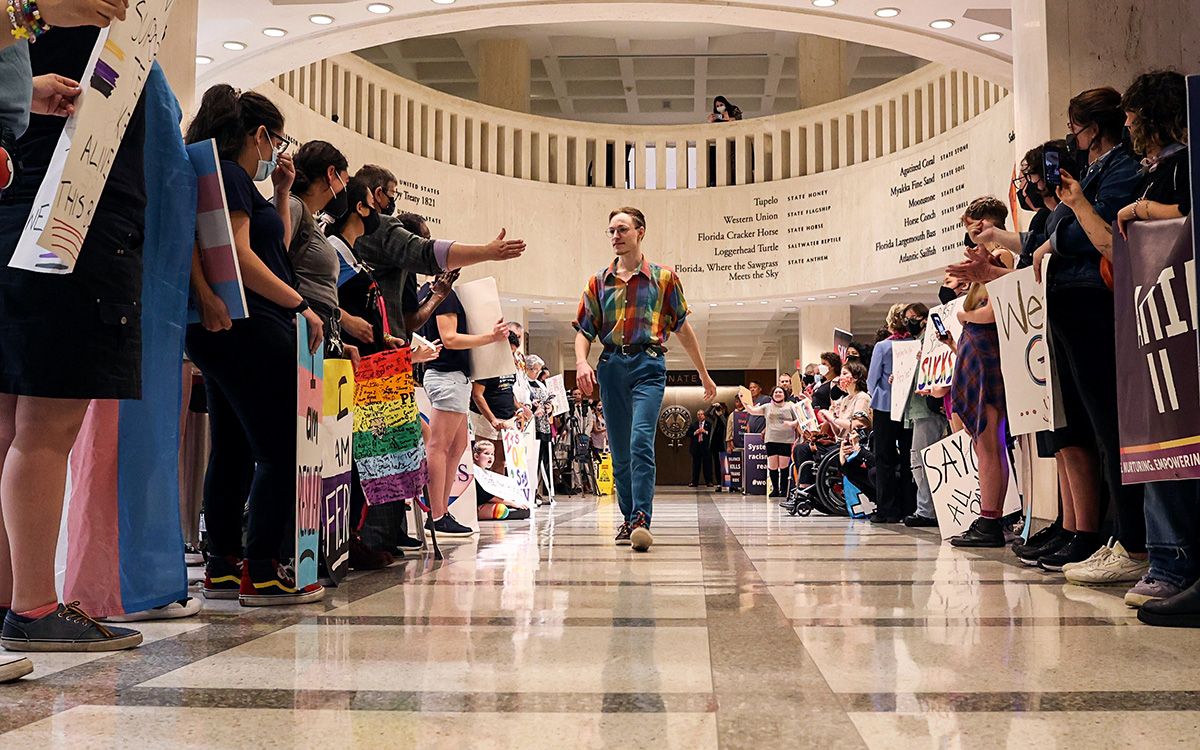
For example, this March, Florida settled a challenge to its “Don’t Say Gay” legislation that significantly lessens its impact. Already, experts warn that HB3 will face legal challenges.
Pain emphasizes that social media is central to LGBTQ activism, especially in Florida. “There have been examples of various movements, where social media has been used extremely effectively, to put across voices to highlight issues that they would not have otherwise had a chance to talk about,” she says, specifically citing counteraction to “Don’t Say Gay.” That is another reason why legislation like this disproportionately harms LGBTQ people and other minority groups, it limits their ability to organize.
Fenning emphasizes that HB3 directly attacks spaces like PRISM, which do not just share information for the LGBTQ community, but provide spaces for them. “Foundationally it provides an opportunity for the community,” he says, but more than anything, it provides a space, where “you can you can learn from your queer ancestors, so to speak, and take charge.” And that is invaluable.
(This story is part of the Digital Equity Local Voices Fellowship lab through News is Out. The lab initiative is made possible with support from Comcast NBCUniversal.)
The White House
Biden hosts Kenyan president, unclear whether anti-LGBTQ bill raised
Jake Sullivan reiterated administration’s opposition to Family Protection Bill

The Biden-Harris administration has not publicly said whether it raised LGBTQ rights with Kenyan President William Ruto during his visit to the White House.
Kenya is among the countries in which consensual same-sex sexual relations remain criminalized.
Opposition MP Peter Kaluma last year introduced the Family Protection Bill. The measure, among other things, would impose the death penalty upon anyone found guilty of “aggravated homosexuality” and would ban Pride marches and other LGBTQ-specific events in the country. Advocates have told the Washington Blade the bill would also expel LGBTQ refugees and asylum seekers who have sought refuge in Kenya.
A senior administration official on Wednesday did not directly respond to the Blade’s question about whether President Joe Biden would speak to Ruto about the Family Protection Bill — neither he, nor Ruto discussed it on Thursday during a joint press conference at the White House. The official, however, did reiterate the administration’s opposition to the bill and other laws around the world that criminalize consensual same-sex sexual relations.
A reporter on Wednesday asked National Security Advisor Jake Sullivan during the daily press briefing about whether Biden would discuss with Ruto any concerns over “some authoritarian moves” in Kenya. (The International Criminal Court in 2011 charged Ruto and five others with crimes against humanity in relation to violence that surrounded Kenya’s 2007 presidential election. The ICC dismissed the case against Ruto in 2016, although the prosecutor said widespread witness tampering had taken place.)
“We’ve seen robust and vigorous democracy in Kenya in recent years,” Sullivan said. “But, of course, we will continue to express our view about the ongoing need to nurture democratic institutions across the board: an independent judiciary; a non-corrupt economy; credible, free, and fair elections.”
Sullivan added “these kinds of principles are things the president will share, but he’s not here to lecture President Ruto.”
“President Ruto, in fact, is somebody who just was in Atlanta speaking about these issues,” he said. “We will invest in Kenya’s democratic institutions, in its civil society, in all walks of Kenyan life to help make sure that the basic foundations of Kenyan democracy remain strong.”
U.S. Ambassador to Kenya Meg Whitman in March 2023 sparked criticism when she told reporters in Kenya’s Kajiado County that “every country has to make their own decisions about LGBTQ rights.”
Biden in 2021 signed a memo that committed the U.S. to promoting LGBTQ and intersex rights abroad as part of the White House’s overall foreign policy. A State Department spokesperson in response to Whitman’s comments told the Blade that “our position on the human rights of LGBTQI+ persons is clear.”
“A person’s ability to exercise their rights should never be limited based on sexual orientation, gender identity or expression, or sex characteristics,” said the spokesperson. “Governments should protect and promote respect for human rights for each and every human being, without discrimination, and they should abide by their human rights obligations and commitments.”
The White House on Thursday released a “Kenya State Visit to the United States” fact sheet that broadly notes the promotion of human rights and efforts to fight HIV/AIDS in Kenya.
• Promoting Human Rights: The United States and Kenya affirm their commitment to upholding the human rights of all. Together they stand with people around the world defending their rights against the forces of autocracy. Kenya and the United States commit to bilateral dialogues that reinforce commitments to human rights, as well as a series of security and human rights technical engagements with counterparts in the Kenyan military, police, and Ministry of Foreign Affairs aimed at strengthening collaboration on security sector governance, atrocity prevention, and women, peace and security in Kenya and regionally.
• Continuing the Fight against HIV/AIDS: The United States and Kenya are developing a “Sustainability Roadmap” to integrate HIV service delivery into primary health care, ensuring quality and impact are retained. With more than $7 billion in support from the President’s Emergency Plan for AIDS Relief (PEPFAR) spanning two decades, Kenya has successfully responded to the HIV epidemic and strives to end HIV as a public health threat in Kenya by 2027. These efforts improve holistic health services for the 1.3 million Kenyans currently receiving antiretroviral therapy and millions more benefiting from HIV prevention programs, while allowing for greater domestic resources to be put toward the HIV response, allowing PEFPAR support to decrease over time.
Biden and Ruto on Thursday also issued a joint statement that, among other things, affirms the two countries’ “commitment to upholding the human rights of all.”
“Our partnership is anchored in democracy and driven by people,” reads the statement. “Together we share the belief that democracy requires ongoing work, and thrives when we commit to continually strengthen our democratic institutions.”
“This historic state visit is about the Kenyan and American people and their hopes for an inclusive, sustainable, and prosperous future for all,” it adds.
The White House said Transportation Secretary Pete Buttigieg and his husband, Chasten Buttigieg, White House Press Secretary Karine Jean-Pierre and Democratic National Committee Deputy National Finance Chair Claire Lucas and her partner, Judy Dlugacz, are among those who attended Thursday’s state dinner at the White House. Ruto on Friday is scheduled to meet with Secretary of State Antony Blinken at the State Department.
Ugandan officials sanctioned after Anti-Homosexuality Act signed
The U.S. has sanctioned officials in Uganda, which borders Kenya, after the country’s president in May 2023 signed the Anti-Homosexuality Act. The White House also issued a business advisory against Uganda and removed the country from the African Growth and Opportunity Act, which allows sub-Saharan countries to trade duty-free with the U.S.
Sullivan, Whitman and Commerce Secretary Gina Raimondo are among the officials who joined Biden and Ruto at a meeting with CEOs that took place at the White House on Wednesday. Ruto earlier this week visited Coca-Cola’s headquarters in Atlanta.
The company announced it will invest $175 million in Kenya.
Coca-Cola on its website notes it has received a 100 percent score on the Human Rights Campaign’s Corporate Equality Index each year since 2006. The company also highlights it has supported the LGBTQ Victory Fund, the Trevor Project, and other “LGBTQI-focused organizations and programs in our communities.”
“Coca Cola is proud of its history of supporting and including the LGBTQI community in the workplace, in its advertising and in communities throughout the world,” says Coca-Cola. “From supporting LGBTQI pride parades to running rainbow-colored billboards, Coca Cola has demonstrated its commitment to protecting employees from discrimination based on sexual orientation, gender identity and expression.”
Health GAP Executive Director Asia Russell in a statement to the Blade said Ruto “is choosing to align with anti-gender extremists and is allowing queer Kenyans to be put at extreme risk.” She also criticized Biden for welcoming Ruto to the White House.
“Biden is campaigning as an LGBTQ+ champion, but he is ruling out the red carpet for someone who is explicitly siding with the extremists,” said Russell. “It’s doublespeak on the part of the White House.”
Brody Levesque, Christopher Kane, and Sam Kisika contributed to this story.
Federal Government
National Park Service clarifies uniform policy
Announcement has implications for Pride
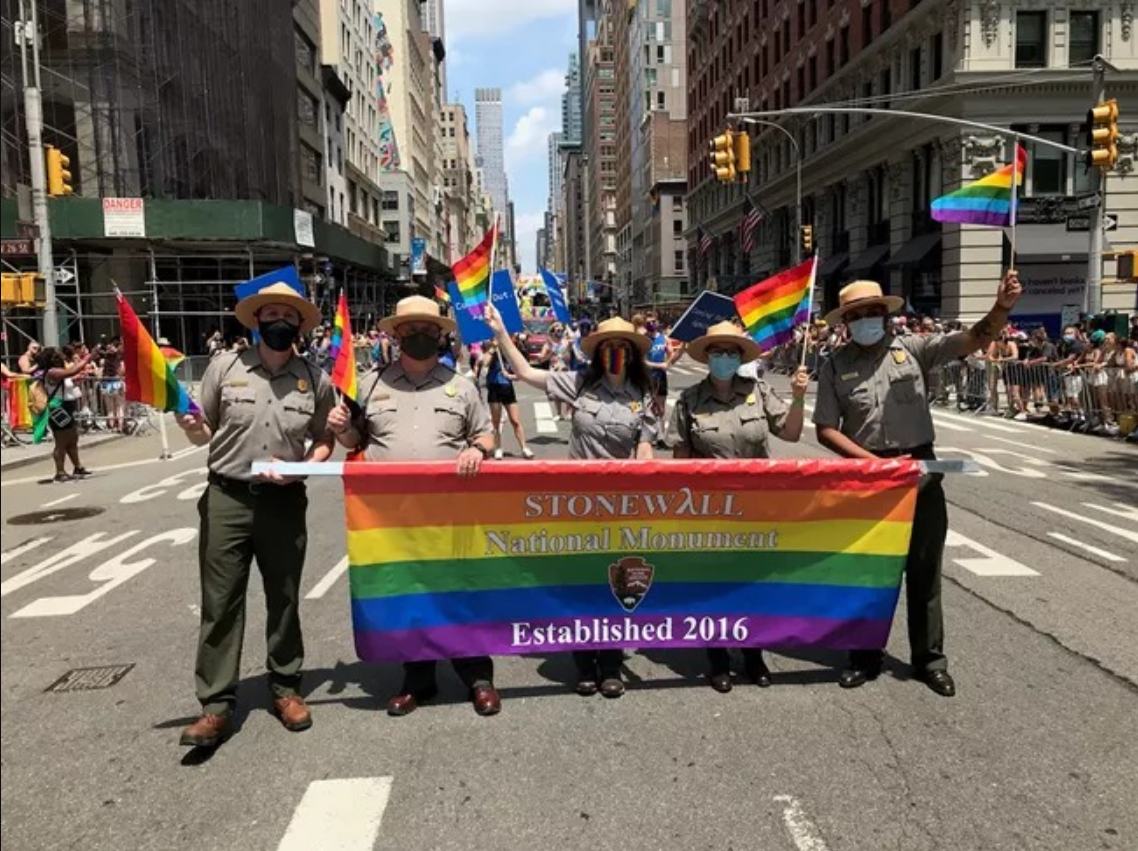
BY ERIN REED | The National Park Service on May 17 clarified its policy on employees wearing official uniforms to non-sanctioned events, which has implications for Pride events.
It’s unclear what triggered the clarification. A source at the National Park Service told the Blade in a statement that the uniform policy “has not changed,” but some LGBTQ employees report feeling betrayed and note that official Pride participation in major cities is uncertain as applications to participate in parades remain unprocessed.
The clarification comes amid increasing crackdowns on Pride flags and LGBTQ people nationwide.
The announcement was first disclosed in a memo to park service employees that did not directly address Pride but stated that “requests from employees asking to participate in uniform in a variety of events and activities, including events not organized by the NPS” conflict with park service policy.
The specific provision cited states that park service employees cannot wear the uniform to events that would construe support for “a particular issue, position, or political party.” Applying this provision to bar Pride participation drew ire from some LGBTQ employees who assert that LGBTQ Pride is not about an “issue, position, or political party,” but about identity and diversity. The employees, who spoke on condition of anonymity, also pointed out that the internal ERG guide allowed for participation in Pride events and that park employees had participated in Pride events with approval for years under the current set of rules.
In a follow-up, the park service stated that the ERG resource known as the “OUTsiders Guide to Pride” conflicts with its policy and that it is in discussion with ERG leaders to review it and similar documents.
Meanwhile, it stated that park service participation in Pride “could imply agency support … on a particular issue of public concern,” essentially stating that celebrations of LGBTQ employees would be considered an “issue of public concern” rather than a non-political celebration of diversity. As such, they determined that park service official participation in parades “should be extremely limited.”
Concern spread among some park service employees . They noted that the park service has participated in Pride parades across the United States for years under the same set of rules, including during the Trump administration, which notably cracked down on LGBTQ Pride in government agencies, such as at embassies abroad.
They also noted that Stonewall National Monument is run by the park service. Importantly, Stonewall National Monument’s founding documents state, “The purpose of Stonewall National Monument is to preserve and protect Christopher Park and the historic resources associated with it and to interpret the Stonewall National Historic Landmark’s resources and values related to the lesbian, gay, bisexual, and transgender civil rights movement.”
One park service employee, speaking on condition of anonymity, stated that multiple Pride parade requests are currently sitting on desks “collecting dust” for participation and representation in major city Pride festivities. When asked about the determination that Pride festivals are an “issue of public concern,” they said, “Pride is not political, it’s not a cause, you just are LGBTQ+. It’s a celebration of who we are.” They added, “Morale is just so low right now. There’s not a lot of fight left in us.”
The Blade reached out to a park service spokesperson to ask about Pride parades in major cities and whether the park service would continue participating this year as they have in previous years. The spokesperson stated that the policy “had not changed” and that “Previous interpretations of the uniform policy were inconsistent and, as you can imagine, approving participation in some events and not others could be seen as discrimination based on viewpoint.” They added that in-park Pride events have not been canceled and that community events outside of the parks that “directly relate to a park’s mission” could be approved. However, they did not indicate whether these events would include continued contingents in major U.S. city Pride parades and celebrations and could not be reached for a follow-up on this question.
Park service resources currently live on the site call for people to “Celebrate Pride,” citing Stonewall National Monument to state that “The LGBTQ experience is a vital facet of America’s rich and diverse past.” This resource emphasizes the importance of not rendering LGBTQ people invisible, stating, “By recovering the voices that have been erased and marginalized, the NPS embarks on an important project to capture and celebrate our multi-vocal past.”
Park Service employees have marched in uniform for years. According to the Bay Area Reporter, in 2014, Christine Lenhertz of the park service requested that a group of LGBTQ park service employees be allowed to wear their uniforms in the Pride parade. They were initially barred from doing so, prompting the group to file a complaint. She then sought a ruling from the Office of the Solicitor for the Department of the Interior, who ruled that there was no reason to bar her and other LGBTQ people from participating in uniform. Since then, many park service contingents have participated in Pride events.
The future of Pride parade participation with in-uniform park service employees is uncertain. While it appears that there will be some Pride events in certain national parks, such as Stonewall, external participation in major city Pride events seems to be on hold in at least some major American cities.
You can see the full response to the request for comment from a park service spokesperson here:
The NPS uniform policy has not changed. There are no restrictions on wearing of uniforms in NPS-organized in-park events. There has been no directive to cancel NPS-organized in-park events. Superintendents have discretion to approve park-organized events, which support park purpose and mission, and departmental mission, initiatives, and priorities (e.g., diversity, inclusion, climate change, and tribal engagement.) This would include many of the events planned to celebrate Pride month.
Official NPS participation in community events that directly relate to a park’s mission can be approved by the park superintendent, provided it is consistent with applicable laws, rules, regulations, and NPS policies.
Last week, the service sent out a reminder about the uniform policy — specifically because there has been an in-flux of requests from folks asking to wear their uniforms for non-park service events. These requests run the gamut of topics, but could include weekend, off duty events that folks are of course able to do in their personal capacity, but not while wearing a uniform representing the federal government. Previous interpretations of the uniform policy were inconsistent and as you can imagine, approving participation in some events and not others could be seen as discrimination based on viewpoint.
NPS employees represent a diversity of identities, cultures, and experiences, and we are committed to supporting all of our workforce. Like any large organization, we have a diverse workforce supporting myriad causes, and we welcome employees to express their personal support for various issues, positions, and political parties, provided they do not imply their presence or endorsement constitutes official NPS support for the same. And, also like other large organizations, there are limits to what employees can do while on-duty and in uniform and seen as communicating on behalf of the NPS.
******************************************************************************************
Erin Reed is a transgender woman (she/her pronouns) and researcher who tracks anti-LGBTQ+ legislation around the world and helps people become better advocates for their queer family, friends, colleagues, and community. Reed also is a social media consultant and public speaker.
******************************************************************************************
The preceding article was first published at Erin In The Morning and is republished with permission.
The White House
Senate confirms Biden’s 200th judicial nominee
Diverse group includes 11 LGBTQ judges

With the U.S. Senate’s confirmation of his 200th judicial nominee on Wednesday, President Joe Biden surpassed the number who were appointed to the federal bench by his last two predecessors at this point in their presidencies.
Among them are 11 LGBTQ judges, the same record-setting number who were nominated and confirmed under former President Barack Obama over the course of his two terms in office.
In a statement celebrating the milestone, Biden highlighted the diverse identities, backgrounds, and professional experiences of the men and women he has appointed over the past four years.
They “come from every walk of life, and collectively, they form the most diverse group of judicial appointees ever put forward by a president,” he said, noting that “64 percent are women and 62 percent are people of color.”
“Before their appointment to the bench, they worked in every field of law,” Biden said, “from labor lawyers fighting for working people to civil rights lawyers fighting to protect the right to vote.”
The president added, “Judges matter. These men and women have the power to uphold basic rights or to roll them back. They hear cases that decide whether women have the freedom to make their own reproductive healthcare decisions; whether Americans have the freedom to cast their ballots; whether workers have the freedom to unionize and make a living wage for their families; and whether children have the freedom to breathe clean air and drink clean water.”
The LGBTQ judges who were confirmed under Biden include Beth Robinson, the first LGBTQ woman to serve on a federal court of appeals, Nicole Berner, the 4th Circuit’s first LGBTQ judge, Charlotte Sweeney, the first LGBTQ woman to serve on a federal district court west of the Mississippi River, and Melissa DuBose, the first Black and the first LGBTQ judge to serve on a federal court in Rhode Island.
Echoing the president’s comments during a briefing with reporters on Wednesday, White House Press Secretary Karine Jean-Pierre noted Biden’s appointment of the U.S. Supreme Court’s first Black woman, Justice Ketanji Brown Jackson.
“We’ve confirmed more Hispanic judges circuit courts than any previous administration,” she said. “We’ve confirmed more Black women to circuit courts than all previous presidents combined.”
Jean-Pierre added that while these milestones are “great news,” there is still “much more work to be done.”
-
Federal Government4 days ago
National Park Service clarifies uniform policy
-
Opinions4 days ago
Urgent concerns arise when congressional staff face ethics investigations
-
District of Columbia5 days ago
60,000 expected for annual D.C. Black Pride this weekend
-
Advice4 days ago
After 16 years together, my wife suddenly wants children
















